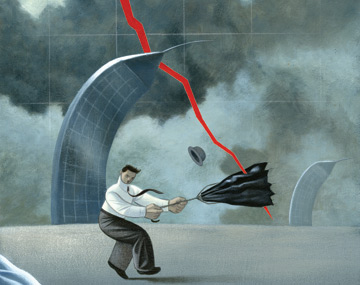
First it was a credit crisis, emerging last summer out of the gone-mad market for subprime mortgages in the U.S. Then it was a U.S. economic slowdown, maybe a recession, which appears to have begun in December. Now it's a worldwide stock-market minimeltdown. At the beginning of the week, Asian and European markets plunged. Wall Street was closed on Jan. 21 for Martin Luther King Day, and to avoid the risk that it would follow other markets south, the Federal Reserve announced a 75 basis-points cut in its key interest rate before the markets opened on Tuesday. Though the street opened down, it quickly rallied — to be followed, at least at the outset, by Asian and European markets.
Say what you will about today's global economy, it ain't dull. And with a significant portion of the world's economic movers, shakers and interpreters gathered in the Swiss mountain town of Davos for the annual meeting of the World Economic Forum just as markets from Mumbai to Madrid were freaking out, there was no shortage of explanations for the cur-rent chaos.
Some folk knew just what to think. "At this time, the debate is not whether we're going to have a soft landing or a hard landing in the U.S., but how hard the landing is going to be," said Nouriel Roubini, a professor of economics at New York University, during the meeting of TIME's Board of Economists on the opening morning of Davos. On the same panel a year before, Roubini's had been the only gloomy voice, which added weight to his discouraging words. Roubini sees a sharp, possibly year-long U.S. recession and a global slowdown.
But let's back up a minute. Why is this happening? Why now? The evidence, and the preponderance of expert opinion here at Davos, points toward the explanation that U.S. consumers — who have been increasing their spending without pause since all the way back in 1991 — are tapped out. Roubini and a few other economic seers have been forecasting that for months. Actual evidence of that has begun appearing in the most recent economic statistics. And the financial system that enabled the spending binge is in the midst of a painful return to sobriety.
Here's one telling statistic, offered during the Board of Economists' meeting by Stephen Roach, the former chief economist of Morgan Stanley, who is now chairman of the investment bank's Asia operation: over time, consumer spending has made up about 67% of economic activity in the U.S. In recent years, consumer spending neared 72%. To rebalance the U.S. economy, the figure is probably going to have to head back to 67%. The question is how long it's going to take. "If we take the five percentage points out this year, it will be the mother of all U.S. recessions," Roach said.
Little wonder that policymakers don't want that adjustment to happen all at once. The Fed's rate cut and the $150 billion stimulus plan currently being mooted by the White House and Congress are all about pumping sufficient demand into the economy that the journey from 72% to 67% can be a smooth and gradual one. But putting the adjustment off indefinitely isn't a great idea either. "It's just pushing the fundamental problem down the road," said Columbia University economist and Nobel laureate Joseph Stiglitz. "The problem with the U.S. is excessive consumption. Do you want to sustain excessive consumption?"
Of late, consumption in the U.S. was excessive because it was fueled not by rising incomes but by rising debt, especially mortgage debt. As houses got more and more expensive, mortgage lenders extended loans that were bigger and bigger in relation to borrowers' incomes. "People can't spend 200% of their income on mortgages," quipped Stiglitz. The only way for this trend to continue was for house prices to keep rising. Then, shock of shocks, they stopped going up, and mortgages started going bad by the millions.
The repercussions continue to spread through the financial system. The situation is certainly worst in home loans, but the troubles in mortgage markets have been causing investors to reassess the risks of other securities. There's no telling what exactly triggered the sell-off in global stock markets on Jan. 21, but one possible candidate was the downgrading by Fitch Ratings the previous Friday of U.S. bond insurer Ambac. The insurer allows cities and other bond issuers to pay lower interest rates because their insured bonds are deemed virtually risk free. But now markets are beginning to question whether Ambac and other bond insurers are really solid enough to confer that kind of distinction.